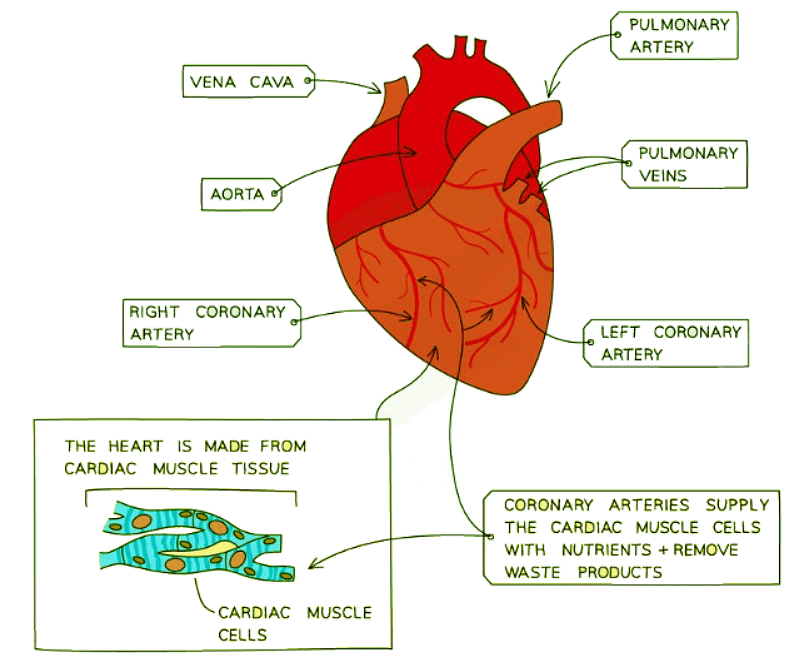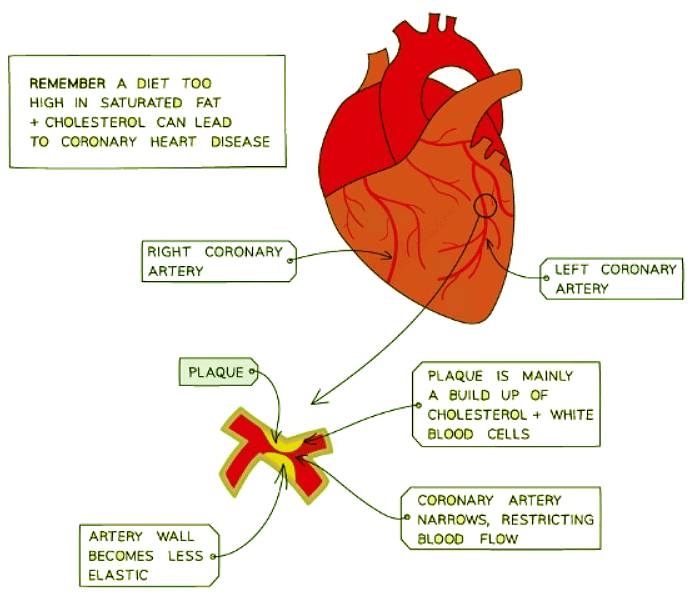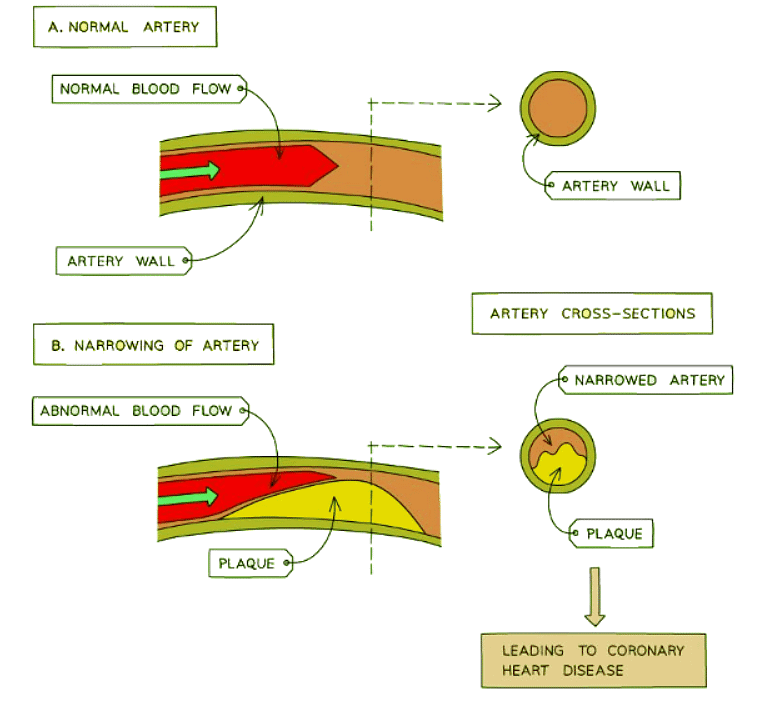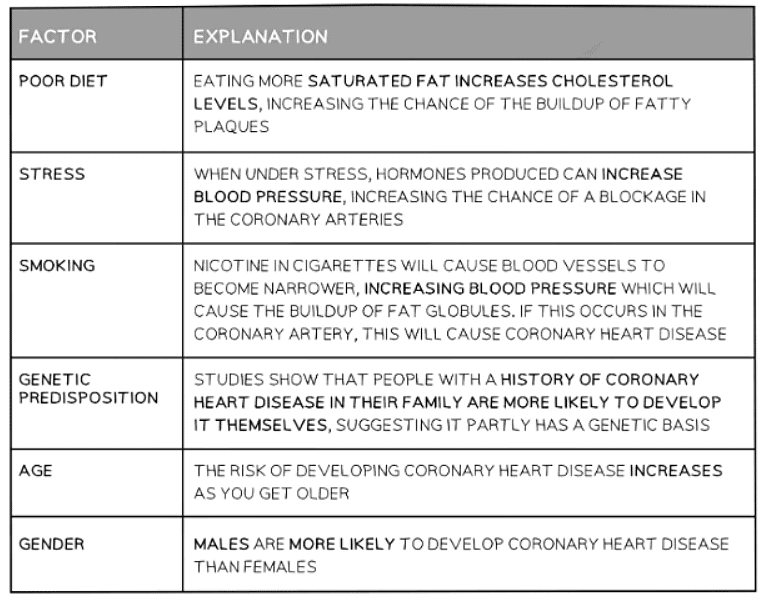Class 10 Exam > Class 10 Notes > Biology for GCSE/IGCSE > Coronary Heart Disease
Coronary Heart Disease | Biology for GCSE/IGCSE - Class 10 PDF Download
Coronary Heart Disease
 The coronary arteries
The coronary arteries
- The heart muscle, like all tissues, requires its own supply of oxygen, glucose, and nutrients, and the removal of waste products such as carbon dioxide.
- This supply is delivered by the coronary arteries, which branch off from the aorta.
- When fatty deposits, known as plaques, partially or fully obstruct these arteries, they lose their elasticity and cannot adequately accommodate blood flow, a condition known as coronary artery disease.
- Partial blockages reduce blood flow to the heart muscle cells, resulting in angina, characterized by severe chest pain.
- Complete blockages prevent oxygen from reaching the affected heart muscle cells, leading to cell death and potentially causing a heart attack.
 Buildup of plaque in the coronary arteries
Buildup of plaque in the coronary arteries
 Effect of narrowing of arteries
Effect of narrowing of arteries
Risk Factors for CHD Table

Diet, Exercise & Coronary Heart Disease
Reducing the risks of developing coronary heart disease:
- Stop smoking: This action is crucial for reducing the risk of coronary heart disease. Smoking cessation helps lower cholesterol levels, promotes weight loss, and improves overall cardiovascular health.
- Healthy diet: Opt for a diet low in animal fats and rich in fruits and vegetables. By making these dietary choices, you can effectively manage cholesterol levels, control weight, and reduce the likelihood of heart problems.
- Regular exercise: Engaging in physical activity on a consistent basis is beneficial for weight management, blood pressure regulation, cholesterol control, and stress reduction. These factors play a significant role in preventing coronary heart disease.
Question for Coronary Heart DiseaseTry yourself: What is the main cause of coronary artery disease?View Solution
The document Coronary Heart Disease | Biology for GCSE/IGCSE - Class 10 is a part of the Class 10 Course Biology for GCSE/IGCSE.
All you need of Class 10 at this link: Class 10
|
101 videos|193 docs|33 tests
|
FAQs on Coronary Heart Disease - Biology for GCSE/IGCSE - Class 10
| 1. How does diet impact the risk of developing Coronary Heart Disease? |  |
Ans. Diet plays a crucial role in the development of Coronary Heart Disease. Consuming a diet high in saturated fats, trans fats, cholesterol, and sodium can increase the risk of developing the disease. On the other hand, a diet rich in fruits, vegetables, whole grains, and lean proteins can help lower the risk of Coronary Heart Disease.
| 2. What types of exercises are beneficial for preventing Coronary Heart Disease? |  |
Ans. Regular physical activity is essential for preventing Coronary Heart Disease. Aerobic exercises such as walking, jogging, cycling, and swimming are particularly beneficial for improving heart health and reducing the risk of developing the disease. Strength training exercises can also help improve overall cardiovascular fitness.
| 3. How much exercise is recommended to reduce the risk of Coronary Heart Disease? |  |
Ans. The American Heart Association recommends at least 150 minutes of moderate-intensity aerobic exercise or 75 minutes of vigorous-intensity aerobic exercise per week to reduce the risk of Coronary Heart Disease. This can be broken down into 30 minutes of exercise on most days of the week.
| 4. Can Coronary Heart Disease be reversed with diet and exercise alone? |  |
Ans. While diet and exercise play a crucial role in preventing Coronary Heart Disease and improving heart health, the disease itself cannot be completely reversed with diet and exercise alone. However, making healthy lifestyle choices can help manage the disease, improve symptoms, and reduce the risk of complications.
| 5. How does stress management play a role in preventing Coronary Heart Disease? |  |
Ans. Stress can have a significant impact on heart health and increase the risk of developing Coronary Heart Disease. Managing stress through techniques such as meditation, deep breathing exercises, yoga, and mindfulness can help reduce the risk of the disease. Prioritizing mental health and well-being is essential for overall heart health.
Related Searches




















